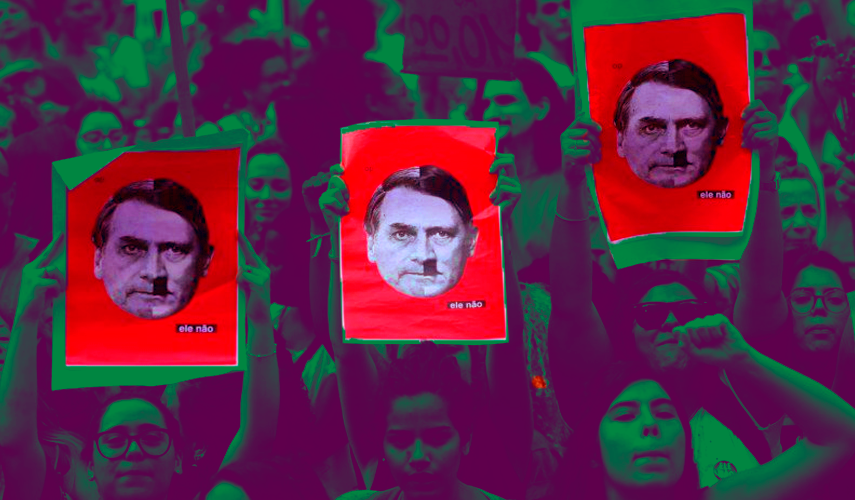Fascism has arrived in Brazil – Jair Bolsonaro’s presidency will be worse than you think

29The world’s fourth largest democracy and the biggest economy in Latin America has elevated a man who promises to imprison or banish his political enemies and who has openly declared he will enact a historic cleansing of the left after taking office. Jair Bolsonaro is not a normal presidential candidate. He is openly hostile to democracy and will probably be the most extremist elected leader in the world.
Bolsonaro is not the straight talking man of the people his supporters claim he is; instead he is the embodiment of the most hardline faction of the military dictatorship that ruled Brazil for 21 years. He claims fidelity to those like his hero Colonel Ustra who embraced torture, murder and rape, as necessary tools in the fight against communism.
Bolsonaro, an ex-army captain turned career politician, has been able to transform anti-systemic sentiment stemming from Brazil’s economic and political crisis into right-wing reaction. Dissatisfaction with Brazil’s corrupt political class has been transformed into a generalised anti-left sentiment, in which the moderate social democratic Workers’ Party (PT) is held responsible for all of Brazil’s problems from unemployment to high crime rates.
Anti-PT sentiment or anti-petismo channelled through a sophisticated WhatsApp operation, spreading fake news illegally financed by Brazilian businessmen, has resulted in a substantial part of the Brazilian population viewing the PT as some sort of combination between the Sinaloa Cartel and Stalin’s Soviet Union. A substantial proportion of Brazilians think the PT was trying to build a communist dictatorship that would turn their children into transexuals. Brazil has real problems, but Bolsonaro proposes nothing beyond shooting his way through the crisis.
But what horrors will he unleash now he has been elected? Bolsonaro will do as he says. He will attempt to criminalise the PT, he will declare social movements such as the Landless Workers’ Movement (MST) and the Homeless Workers’ Movement (MTST) terrorist organisations. He has the backing of much of the country’s political and economic elite, along with the military, to do his best to violently destroy Brazil’s parliamentary and extra-parliamentary left.
His economic programme at the moment constitutes nothing but handouts to big business, a fire sale of state owned enterprises and the crushing of what remains of Brazil’s social rights. Bolsonaro has promised to give police “carte blanche to kill” and do away with human rights. Where the police officially already kill over 5000 people a year we should heed Bolsonaro’s words: it is safe to predict that thousands of mostly black poor Brazilians will be slaughtered in the name of making Brazil safe again. This will include left-wing activists and indigenous people struggling to protect their communities from landowners. Academics and journalists critical of Bolsonaro are already being targeted, not just by Bolsonaro’s rabid fans, but also by the police.
His followers have already started. His election has signalled to the most rabid and reactionary elements in Brazilian society that they can get away with murdering trans women and socialists. The violence that already exists in Brazilian society is now congealing under a clear political banner.
It is a mistake to think Brazil’s institutions are working and will serve to control and limit Bolsonaro. If anything Brazil’s judiciary, heralded by the international press for its “anti-corruption” efforts, have moved to back Bolsonaro against his opponent Fernando Haddad of the PT. For instance, Judge Sergio Moro, the protagonist of Lava Jato (Operation Car Wash: Brazil’s gigantic anti-corruption investigation) released damaging testimony from an ally close to the now jailed ex-PT leader Lula in the week before the first round of the election. Collected six months previously, the information was designed to enact maximum damage to the PT’s electoral prospects. Even if Bolsonaro finds himself caught up in the mess of Brazil’s corrupt congress, it might just be the case that the military might directly step into ensure that Brazil is restored to governability.
What lessons can be learnt globally from this? Brazil’s elite, when faced between the choice between a moderate social democratic party and fascism, opted enthusiastically for the latter. It is becoming increasingly clear that when the interests of the market are threatened, democracy is an easy price to pay. The result spells disaster, not only for Brazil but for the planet. In Bolsonaro’s Brazil you may be able to buy a gun but gay couples will not be able to hold hands in public. Brazil will “modernise” through such measures as having creationism taught in schools.
Bolsonaro will align himself to the wave of far-right reaction that is sweeping the world. He will move as closely to Trump as possible, probably pull out of the Paris climate accords and open a new Brazilian embassy in Jerusalem. His victory marks a setback for civilisation. Urgent international solidarity is needed for those Brazilians in Bolsonaro’s crosshairs.
Benjamin Fogel is a PHD candidate in Latin American History at New York University and a contributing editor at Jacobin and Africa is a Country.
